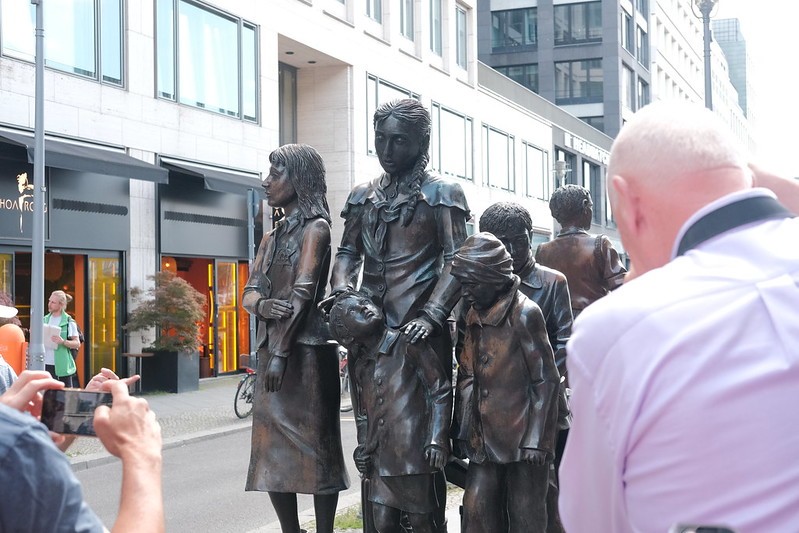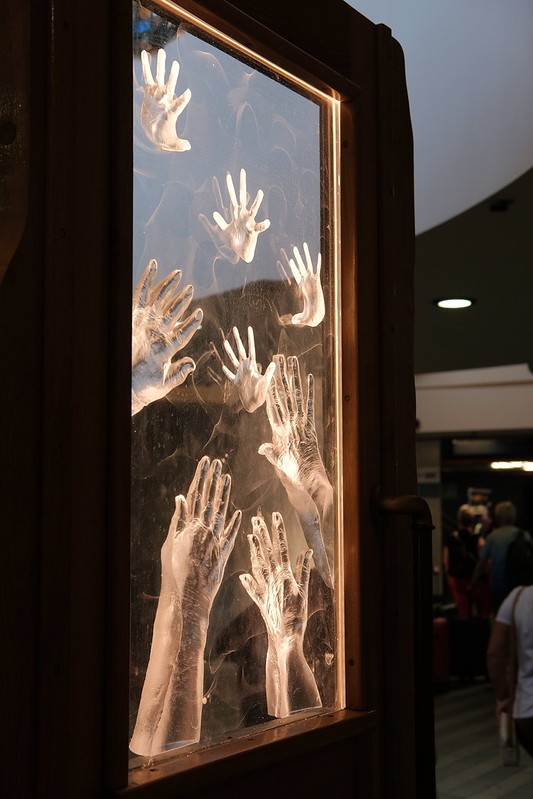PRAGUE – In a quiet voice, Nick Winton prompted the group of 16 teachers to step into the shoes of Jewish parents in 1939 Europe.
“Imagine what it must be like when your child – you’ve been through the diaper stage and the terrible twos, and you’re now starting to see your child with a personality developing. And it’s absolutely adorable,” Winton said.
“But life is so bad, that you feel you’d have to send them away somewhere safe. And you put them on a train to a country you’ve never been to, to be brought up by strangers who you’ve never met, where they speak a language you don’t understand. How bad must life be for you to do that?”
The room was still. Over the course of two weeks, these teachers – part of the Power of Place educational trip run by the Jewish Community Relations Council of Minnesota and the Dakotas and Humanus Network – had visited concentration and death camps, seen where Jews once lived and had been trapped in ghettos, and, at Berlin’s train station, seen a memorial to the 1.5 million Jewish children murdered in the Holocaust.

The “Trains to life, trains to death” memorial at the Berlin train station to the Jewish children caught under the threat of Nazism (Lev Gringauz/TC Jewfolk)
Titled “Trains to life, trains to death,” the bronze sculpture memorial shows one set of Jewish children in disheveled clothing, huddled together in confusion and misery, on their way to certain death. On the other end, a well-dressed boy and little girl walk with a confident, if uncertain, air toward freedom.
The latter two signify the Kindertransport program (actually a variety of ad hoc rescue missions across Europe, rather than one cohesive program) in which Great Britain let in around 10,000 mostly Jewish child refugees fleeing the Nazis. Winton’s father, Sir Nicholas Winton, was one organizer of the Kindertransports, and helped some 669 children from Prague relocate to safety. Most never saw their parents again.
“As far as he was concerned, he was a bloke in a suit who just happened to be in the right place,” Winton said of his father. “And rather than saying, ‘Someone should do something about it,’ he said, ‘Well, I can have a go.’ And he did.”
The trip participants, most of them parents, soaked in the message that Winton had for them: That his father’s work represents the potential for any one person to make a difference, no matter how small.
“Every one of us, every day, we change the world,” Winton said. “But we do it mainly in a small way, you know, somebody who’s feeling a bit depressed, and you smile at them. And it gives them a lift…you think it’s easy, but you’ve got no idea what a difference it may have made.”
Sir Nicholas Winton’s story was recently re-publicized in a movie called “One Life,” which dramatized how he put together eight Kindertransports with the help of his mother, co-organizers based in Prague, and a good deal of forcefulness against British officials dragging their feet to help refugees.
The movie also revisits the famous moment in 1988 when a BBC TV program invited Sir Nicholas Winton and surprised him by reintroducing him to some of the people he had helped save. Until then, the elder Winton had never spoken of the Kindertransport work – not even with his own children.
“He was definitely hijacked, and came from an era of not expressing emotions,” Winton said of the TV program. “The fact that he teared up is, for him, unbelievable, he was so moved by it…he lived for another 25 years and was delighted to meet some of the children, and made great friends with some of them.”
While the movie was not exactly accurate, Winton said it was 95% true to life – while the other 5%, if not factual, still captured the essence of the story and his father’s character.
“Did my father ever break down in tears by the pool? I never saw him weeping,” said Winton. “But from a creative perspective, it is a wonderful way of demonstrating the emotional turmoil that he was in.”

A close-up of the “Farewell Memorial” to the Kindertransports in the Prague train station (Lev Gringauz/TC Jewfolk)
The movie also, perhaps most importantly, showcased the elder Winton’s attitude toward public service.
If “you see something that needs to be done, you get some mates together and have a go and do it yourself,” Winton said. “It’s better to ask for forgiveness than for permission. So if someone says, ‘No, you can’t do that.’ You say, ‘Oh, why not? Sorry.’”
Hearing the legacy of Sir Nicholas Winton was an important uplift for the teachers after a difficult two weeks, which Kristin Thompson, one of the trip leaders, spoke up to note.
Winton’s story is “an incredible example for all of us of what we now take home, and how we can make an impact not only with and for our students, but ourselves as well,” she said. “We’ve been on a very emotional journey and in some dark places. And it’s so important to remember: we can make a difference.”
After the meeting, much of the group walked to the Prague train station to see the two memorials here to Sir Nicholas Winton and the Kindertransport. The first, a somber statue of the elder Winton with children, was visible on platform 1A.
The second, deeper in the station, was perhaps more painful: A replica of a train door with imprints of adult hands – signifying parents – on one side of the glass, and small hands – signifying the children they sent to safety – on the other side.
The display is simply called “Farewell Memorial.”


















